I'lam Publishes Latest Findings on Human Rights Sensitive Journalism in the Arabic and Hebrew Media in Israel
Israeli media: Human Rights Issues Addressed but Palestinians Conspicuously Underrepresented in Coverage
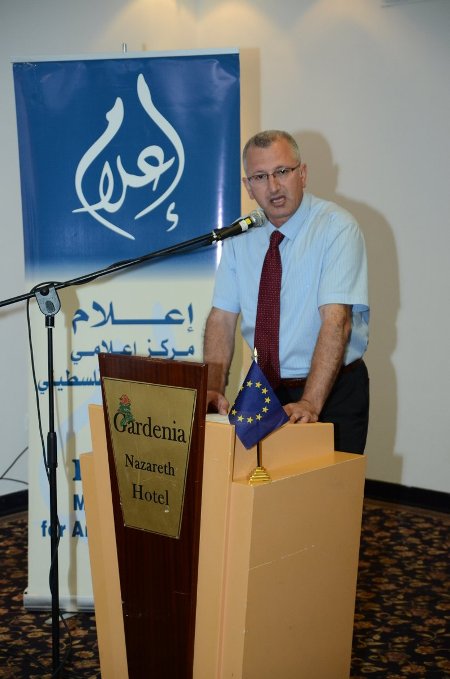
Dr. Amal Jamal-Director of I'lam
On Tuesday June 12th, I’lam hosted a conference in Nazareth, where they presented their latest research findings to human rights activists and journalists from the Arabic and Hebrew media on “ Human Rights Discourse in the Arabic and Hebrew Media”. The conference is part of a three-year EU-funded project that pivots on freedom of expression as a means to build a culture for human rights sensitive journalism in Israel. The EU Ambassador to Israel, Andrew Standley offered the welcome address.
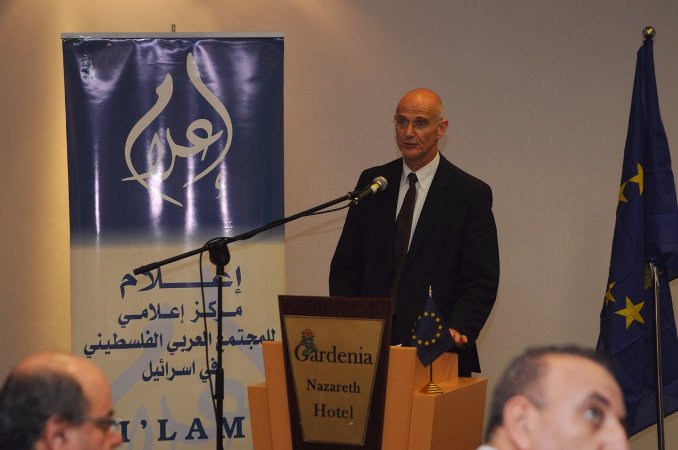
EU Ambassador to Israel-Andrew Standley
I’lam’s General Manger, Dr. Amal Jamal commenced the discussion by welcoming the audience. He spoke about freedom of expression and the need for this norm and its associated values to be more stringently upheld in both the media and in general society.
The EU Ambassador emphasized his satisfaction with the project's mandate to promote freedom of expression, and pushed the importance of the idea that journalists should work without interference or their rights being violated, linking with the emphases of May 3rd World Press Freedom Day. Dr. Jamal and I’lam’s Arabic Media Coordinator Samah Bsoul revealed their research findings on the human rights discourse in the Arabic media in the first panel. According to Bsoul, human rights discourse in the Arabic media is mostly marginalized. For example, journalists on average cover violations of human rights without taking a position supportive of the rights, which were violated, and overwhelmingly without an essential understanding of the human rights corpus, its norms and standards.
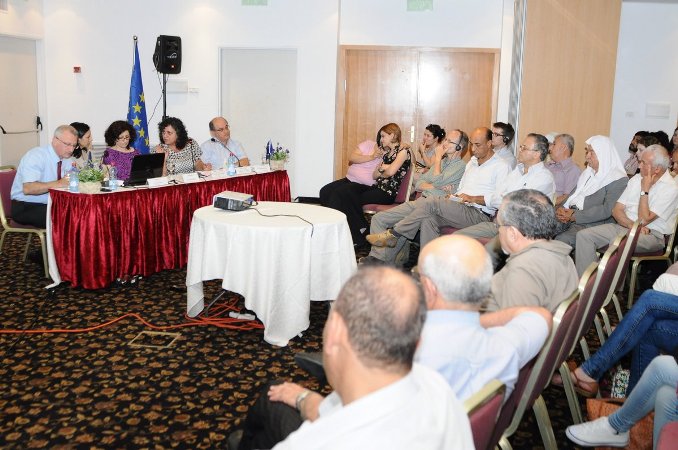
Editor and Chief of Al-Ittihad newspaper, Ms. Aida Tuma-Suliman, emphasized the necessity to monitor political party newspapers (while the research monitored only commercial newspapers), since party newspapers proceed from an intellectual system based primarily on human rights. General Director of HRA (Arab Association for Human Rights) Mohammed Zeidan stated, “The research's findings are a picture which describes not only the media landscape but also society,” meaning to say that lack of engagement with human rights language, norms and ideas in its present contemporary form is both in the media and in the everyday practice of the average person.
Human rights lawyer Dr. Sonia Boulos on the other hand referred to the media as “a fourth authority that we expect to make change by challenging arbitrary government action.”
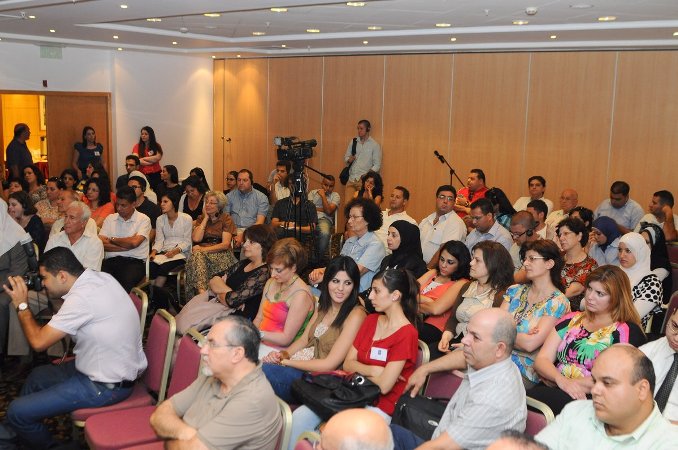
Various Jounalist at the Conference
The second panel dealt with the human rights discourse in the Hebrew media. Both Dr. Amal Jamal and I’lam’s Hebrew Media Coordinator Ms. Kholod Massalha covered this subject. Their research demonstrated simultaneously how Israeli media is largely supportive of the human rights for Jewish Israeli society, while marginalizing human right coverage on Palestinians, particularly in Occupied East Jerusalem, though human rights sensitive coverage was sparse when referring to Palestinians in the West Bank, Gaza Strip, and of Palestinian citizens in Israel as well.
Ha'aretz journalist Jacky Khoury moderated the panel. Khoury opened the panel by affirming the importance of there existing human rights values in Hebrew media discourse, especially because this media should cover the human rights violations in the Occupied Palestinian Territory. Dr. Hagar Lahav from Sapir College noted that this research is the first in its field, and added that the issue of 'media's human rights discourse’ is a necessary but unattractive topic for the media.
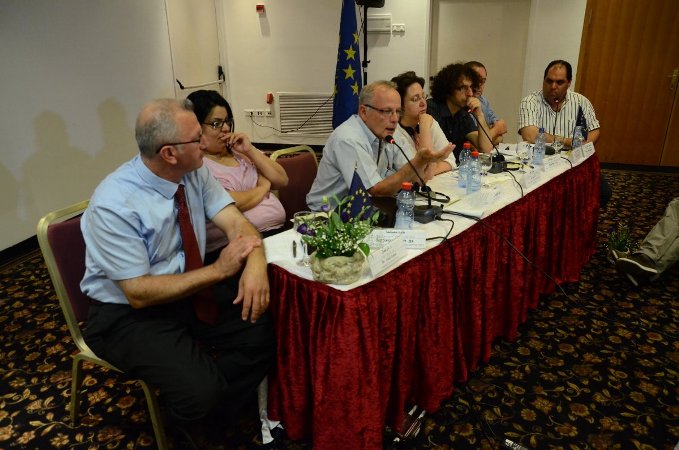
Moreover, political analyst Akiva Elder, also from Ha'aretz, underscored the various restrictions to covering human rights issues freely in the Hebrew press and spoke at many a moment of his own experiences. Ron Goldstein, spokesperson for the International Red Cross - Israel said that the Hebrew media ignores the human rights issue as a valued global system.
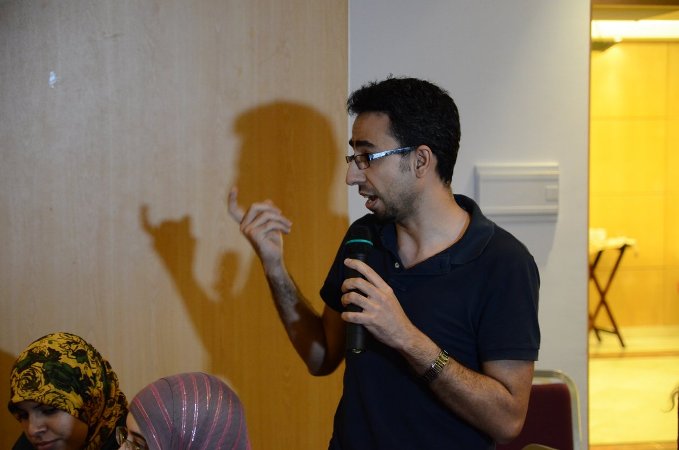 Q&A Panel Opens Floor for Discussion Q&A Panel Opens Floor for Discussion
Chief Legal Counsel of The Association for Civil Rights in Israel (ACRI), Dan Yakir spoke of ACRI's own experience of increasing its engagement with the media for the reason of exposing human rights violations and raising public awareness and discussion on the same.
The conference also included the screening of I'lam’s recent movie, “I have the Right” which spoke of free expression and encouraged plenty of debate in society following its online release.
For further reading on the subject:
The Marginality of Human Rights Discourse in the Local Arab Press in Israel
Summary/Full Version
The Discourse of Human Rights in the Israeli Media
Summary/Full Version
Disclaimer: The contents of this press release are the sole responsibility of I'lam and can in no way be taken to reflect the views of the European Union |